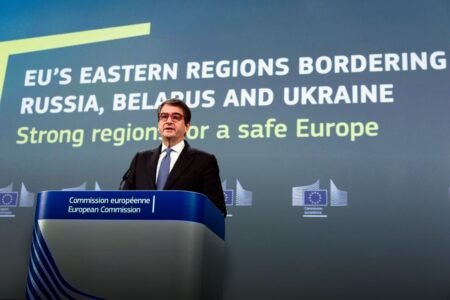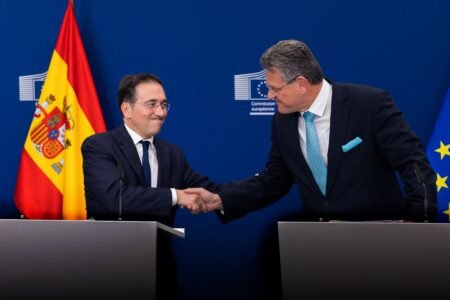(BRUSSELS) – The EU Commission set out a reflection paper Wednesday outlining options to address the growing security and defence threats facing Europe and to enhance Europe’s own abilities in defence by 2025.
The reflection paper comes at a time when Europe’s security is under increasing threat, when U.S. president Donald Trump has made clear his wish for Europe to spend more on its own defence, and when the Brexit vote only adds to the uncertainties facing Europe.
68% of Europeans would like the EU to do more on security and defence policy, according to a Eurobarometer survey from March 2017.
And it was in March that the 27 Heads of State and Government adopted a declaration which stated that they ‘pledge[d] to work towards a Union ready to take more responsibilities and to assist in creating a more competitive and integrated defence industry.”
The reflection paper is complemented by concrete proposals to launch a European Defence Fund of EUR 5.5 billion per year to boost Europe’s joint defence capabilities.
While making clear there is no intention of either duplicating or replacing NATO, and while EU countries remain responsible for their defence and security, foreign policy chief Federica Mogherini sees the field of defence as “one of the major fields in which we could relaunch the European Union.”
The limits for action on defence in the EU Treaties are clear, she said, but there is also scope to boost action in the fight against terrorism in particular: “Through the European Union, we can support Member States in developing military capabilities and investing more efficiently in defence,”.
The EU is the world’s second largest spender on defence: in 2016 the US spent 546 billion in current prices, the 28 EU countries spent 206 billion, while the next biggest spender was China with 131 billion.
However, EU countries waste an estimated 26.4 billion every year because of duplication in defence spending, overcapacity and barriers to defence procurement.
EU leaders are due to meet in Prague on 9 June to discuss how to use the potential of the Treaties for stepping up cooperation in defence. The Commission contribution to that discussion, and to the broader EU-wide debate on defence, is a set of three possible scenarios for the future of European defence.
- Under a “Security and Defence Cooperation” scenario, Member States would still decide on the need for security and defence cooperation on a voluntary and case-by-case basis, while the EU would continue to complement national efforts. Defence cooperation would be strengthened, but the EU’s participation in the most demanding operations would remain limited. The new European Defence Fund would help develop some new joint capabilities but Member States would still oversee the bulk of defence capabilities’ development and procurement individually. EU?NATO cooperation would retain today’s format and structure.
- Under a more ambitious “Shared Security and Defence” scenario, Member States would pool together certain financial and operational assets to increase solidarity in defence. The EU would also become more engaged in Europe’s protection within and beyond its borders. It would take on a greater role in areas like cyber, border protection or the fight against terrorism, and strengthen the defence and security dimension of internal EU policies like energy, health, customs or space. This would be matched by a political will to act, as well as decision-making fit for a rapidly changing context. The EU and NATO would also increase mutual cooperation and coordinate across a full spectrum of issues.
- The most ambitious “Common Defence and Security” scenario foresees the progressive framing of a common Union defence policy, leading to common defence based on Article 42 of the EU Treaty. The existing provision allows a group of Member States to take European defence to the next level. Under this scenario, protecting Europe would become a mutually reinforcing responsibility of the EU and NATO. The EU would be able to run high-end security and defence operations, underpinned by a greater level of integration of Member States’ defence forces. The EU would support joint defence programmes with the European Defence Fund, as well as set up a dedicated European Defence Research Agency.This would also foster the creation of a genuine European defence market, able to protect its key strategic activities from external takeovers.
Questions and Answers The Future of European defence
Reflection paper on the future of European Defence
European Defence Fund








